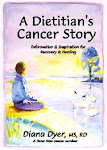Calling all cancer patients!!
Ask your cancer doctors (surgeon, medical oncologist/hematologist, radiation oncologist) which one of them is going to develop and explain your Cancer Survivorship Care Plan at the end of your treatments. Don't go home after treatment is completed simply to say to yourself "What do I do now? What's next? What do I need to monitor?" or worse, and I mean this sincerely, simply put your head in the sand or your blinders on while saying "Whew, that's over with, now I can forget this ever happened".
My own oncologist candidly told me several years ago that the oncology community didn't even know there was a ball game in town (i.e., unmet survivorship concerns) to have dropped the ball. How's that for being straight forward?
Grass roots efforts have changed that understanding, with the oncology community catching up by gradually developing guidelines for survivorship concerns geared to specific cancers and specific cancer treatments. They consist of a written summary of your diagnosis and treatments along with recommendations for specific follow-up health issues of concern based on the type of treatments.
These written guidelines are not yet developed for all cancers, there is no "mandate" requiring them (yet) as part of true comprehensive cancer care, and there is concern that doctors won't have the time anyway to actually use them to help you take care of yourself after the cancer treatments. SO, I highly recommend that YOU (the patient) insist on your doctor doing so.
Survivorship concerns are legitimate concerns and frankly are a "problem of success". If cancer was not diagnosed early enough to be considered treatable, there would be very little call for more proactive and coordinated care for those people living years, even decades, after a cancer diagnosis, as is frequently the case these days.
These care plans are to include specific nutritional and lifestyle recommendations for optimizing health and wellness after cancer, too, so make sure that those concerns are included and discussed in your cancer survivorship care plans. Don't let your doctor tell you nutrition does not matter or to just "eat right and exercise". Ask for a referral to a Registered Dietitian who can help assess your current nutritional status post-treatment, ALL of your nutritional concerns (i.e., do you need to lose weight or gain weight, are you at risk for or already have developed diabetes, heart disease, osteoporosis, etc, in addition to wondering what foods are the best to eat to reduce the risk of your type of cancer recurring). She will also help prioritize and pull all these concerns together, work with you in a step-wise fashion to develop a plan for the changes that are both helpful and reasonable, and then be your cheerleader along the way as you make these changes for your health.
Take care of yourself! Speaking up to ask for these cancer survivorship care plans as a component of your full comprehensive cancer care is important. Don't by shy. Think of your self-advocacy as "Active Hope"!
Diana Dyer, MS, RD
Tuesday, September 25, 2007
Subscribe to:
Post Comments (Atom)


4 comments:
Are there any care plan templates available that might help cancer survivors know what to discuss with our oncologist, a registered dietitian, etc.?
The Oncolink website has a template that any patient or provider can enter patient diagnosis/treatment information into and then generates a patient specific care plan. It's a great resource - www.oncolink.com/oncolife
Thank you for pointing out that the Oncolink web site does have a cancer survivorship template that is easy to use if a patient knows his diagnosis and type(s) of treatment and therapies he has undergone. The resulting medical information that outlines what to monitor after therapy is completed seems very thorough.
Oncolink has long had my deepest respect and admiration as it has been the internet leader for providing patients with in-depth reliable information about their cancer diagnosis and treatments. So I am not surprised that Oncolink is also committed to providing useful information to patients in regards to cancer survivorship concerns.
However, general comments such as "maintaining a healthy weight and eating a health conscious diet" are just that, "general", and these recommendations don't seem to register with the majority of the population or translate into lifestyle changes that result in improved health. With greater than 2/3 of the American population being overweight or obese (and those numbers only increasing with an increased risk of many types of a primary cancer, breast cancer recurrence and death, and multiple other chronic health conditions), it is apparent that general messages are not enough to really help people make the lifestyle changes that will lead to optimizing both cancer recovery and overall health.
A cancer diagnosis is the proverbial "teachable moment" when a Registered Dietitian (RD) can prioritize appropriate nutrition information for the patient into achievable steps that are individualized for each person's full medical history, risk factors, and concerns.
I didn't review each and every combination of survivorship recommendations possible from these templates, but the only one I saw where a referral to a 'nutritionist' was recommended was for patients who were losing weight after therapy to an area of the body that included the esophagus.
I think each and every patient should have a recommendation to see a Registered Dietitian to help set up a nutritional recovery plan. Idealistic? Maybe yes, but not unachievable.
If your cancer survivorship care plan does not include a specific recommendation to see an RD to help define, prioritize, and guide your nutritional goals for cancer recovery and reducing risks associated with treatments' potential late effects, ASK FOR ONE, i.e., insist and don't take "No" for an answer. :-)
Good for people to know.
Post a Comment